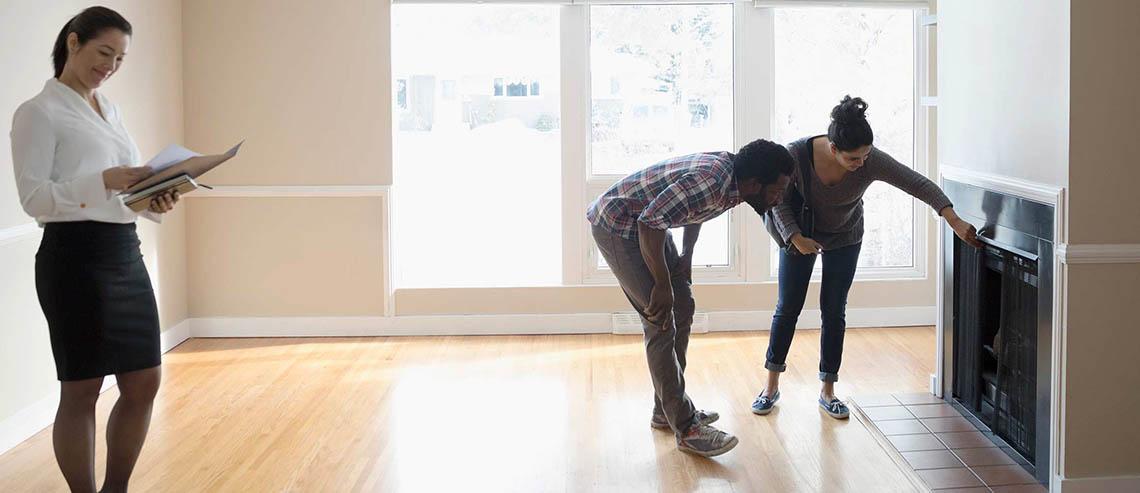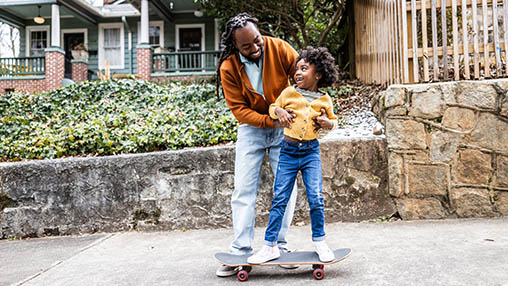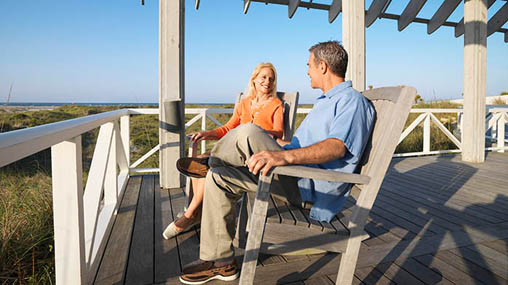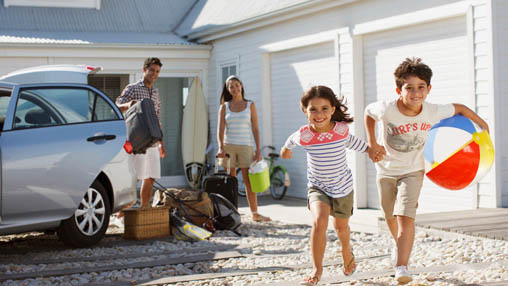
Earn cash back
after close!
With Home Connect, you could earn $350 to $9,500 cash back after close.
What does your ideal home look like? Is it a classic Victorian set far back from the road with stately elm trees shading the formal garden, or a brand-new split level in an up-and-coming housing development with a communal pool, tennis courts, and a playground for the kids?
Old vs. new: It's an age-old debate. And when it comes to choosing whether to purchase an existing home or opt for new construction, there's a lot more to factor in than the curb appeal or how it would look dressed up in Christmas lights.
For most of us, a home (whether new or existing) is typically the biggest purchase we'll make in our lifetime, so it's important to make the right decision.
Do homes really age like fine wine, or is newer always better? Let's explore.
The Pros of Buying a Newly Constructed Home
To some, a new home is the ultimate status symbol; others simply enjoy the convenience and peace of mind that comes with new construction. And there's no denying that brand-new homes have their fair share of benefits. Let's take a look at the pros of newly-built homes.
- Builder's warranties. New homes generally are backed by a builder warranty for the first 10 years or so. Your roof probably won't leak, and if it does, it's covered, along with most of all the other structural components of your home.
- Customization options. When you work with a builder, you have more freedom to customize your new home. Go ahead and get the granite countertops you've always wanted, or the sunken garden tub in the master bath. (Just be aware that these extras come at a price.)
- Less maintenance. New appliances, wiring, and plumbing mean that things are less likely to break down right away. You may have years or even decades before you'll have to worry about replacing the dishwasher or having a plumber come to work on the bathroom sink.
- More neighborhood amenities. Since new construction tends to come in the form of subdivisions, you may enjoy things like a neighborhood clubhouse, pool, playground, or other recreational facilities.
- Energy efficiency. Double-paned windows, HVAC systems, energy efficient appliances, and adequate door and window seals keep energy in, lowering your heating and cooling bills and saving you money over the life of the home. You may even get certain tax rebates or incentives for promoting energy efficiency.
- Smart features. Builders have jumped on the smart-home bandwagon, and a new home will more likely feature high-tech amenities like built-in USB adapters, whole home speaker systems, thermostats you can control from your smartphone, and more.
- Less competition. In a hot market, existing homes can be snatched up quickly, often before the listing ever goes live. Since builders often construct dozens of new houses at a time, it's easier for you to get your ideal home without having to stand in line or engage in a bidding war.
The Cons of Newly Constructed Homes
A new home isn't all shiny appliances and Alexa-enabled bathrooms. For all the benefits of new construction, there are some drawbacks, too.
- A higher price tag. According to one source, the average cost of purchasing a new home is $300,000, versus $278,000 for an existing home. Sure, you may recoup that difference eventually, but it's still good for some sticker shock at the onset.
- Strict homeowners' association rules and fees. The amenities that were a pro in the last section could very well become a con eventually. Someone has to pay for that pristine neighborhood pool and state-of-the-art fitness center, and that someone is likely you. HOA fees can range from $200-$400 per month — and that's not to mention the strict rules that come along with the privilege, like having someone tell you what color your house can be painted and when to mow your lawn.
- Higher property taxes. Generally speaking, the more your home is worth, the more you'll be shelling out to your state for property taxes. And in new neighborhoods with higher than average property values, that can be a pretty penny.
- Location, location, location. There's no room for new construction in populated cities, which means that most subdivisions are on the outskirts or beyond. This can lead to an increase in commute time and/or more money you'll need to shell out for public transportation.
- Uncertainty. That shiny new subdivision looks good now, but how will it look in 10 years? What if half of the houses go unfilled, or the neighborhood deteriorates considerably? What if that gorgeous field behind your back deck is bought by a sewage treatment plant? All neighborhoods can change, but it's particularly difficult to project how a brand-new neighborhood will shake out.
The Pros of Existing Homes
While some love what may be referred to as the "new-home smell," others are equally enamored with the homes of yesteryear — whether that means a 5-year-old ranch-style home or a 19th century Craftsman. And there are some definite pluses in the existing home column.
- Cheaper selling price. An existing home can be 20% less expensive than a new home, allowing you to effectively get more house than you could have had you chosen a new construction.
- Lasting construction. When it comes to purchasing existing homes, the phrase "they just don't make 'em like they used to" gets thrown around a lot — and for good reason. While today's newer homes sometimes feature construction materials that seem to have been made by the cheapest bidder, older homes were usually built to stand the test of time — and they're still standing. In many cases, you can expect solid construction through and through.
- Location, location, location (again). Existing homes were likely built when the city was less crowded. You might find the perfect home within walking distance to your job, popular restaurants, museums, parks, and other prime destinations.
- A history. Yes, it might sound cheesy to the new-home crowd, but an existing home has a character that new tract houses just can't hope to aspire to — yet. Architecture and history aficionados appreciate old-world charm and the stories an older house has to tell.
- Established neighborhoods. While a new neighborhood could transform completely over a decade or so, existing homes have matured along with their neighborhoods, and it's less likely for drastic changes to occur. Keep in mind that any big changes to existing structures can often be prohibited by zoning laws. Typically, what you see is what you get.
- Bigger yards and mature landscaping. In a new subdivision, space comes at a premium. In some, it's possible to pass your neighbor a cup of sugar through your open kitchen windows. Older homes tend to have bigger lots, providing more outdoor space for children, pets, and entertaining. And since the trees, bushes, and shrubbery have had years or decades to mature, the landscaping typically feels more settled and can provide much-welcomed privacy for both you and your neighbors.
The Cons of Buying an Older Home
Old-world charm, bigger yards, and a cheaper asking price are fantastic, but they can come with some serious drawbacks, including:
- Repairs. Older homes are notorious for needing repairs. Sometimes it's something relatively simple, such as replacing the water heater. Other times, the fuse box explodes on Monday and the septic tank overflows on Wednesday. When buying an existing home, it's crucial that you have an emergency fund set up to handle any unexpected home repairs.
- Trouble obtaining financing. Some homes pass inspection with flying colors, and the loan goes through immediately. For others, the home inspection leads to unforeseen problems and can cause your lender to back out of the deal. Existing homes can be much more difficult to finance if there are underlying problems.
- Competition. There may be 20 new tract homes available, but there's only one ranch-style home in your favorite neighborhood with all the coveted features you are looking for (and 10 other buyers feel the same). Competition can be fierce, and you may end up offering more than you wanted for it just so you can call it your own.
- It may not be up to code. Outdated plumbing, asbestos in floors or ceilings, unsafe electrical wiring — the list goes on. An existing home may cost you thousands of dollars just to get it up to code, and if you're not planning for the expense, it can be a disaster.
- Outdated everything. If you've ever pined for an avocado-green fridge, stove, and oven, you may be in luck — but you're also in the minority. Appliances and fixtures in existing homes could be as old as the home itself. You may find yourself purchasing all new appliances, which adds up over time.
- Increased energy bills. Older homes have a tendency to be drafty, which can translate to your hard-earned money literally going straight out the window. And updates to solve for a home's lack of energy efficiency can be very expensive. For example, you'll spend about $19,000 to reoutfit a 2,450-square-foot home with energy-efficient vinyl windows. Looking to upgrade those baseboard heaters to a full HVAC system? Expect to spend $6,000-$12,000 for a 1,000-square-foot house — and prices only go up from there.
Other Homebuying Considerations
New or old, existing or not, there is plenty of thought that must go into what sort of home you want to buy. It may be advantageous for you to take a tour of houses from both camps to better determine what best fits your needs.
You may be a staunch new-construction buyer and fall in love with a cute little bungalow in your favorite neighborhood. Or you might think you want a brick home on a quarter-acre lot only to be wooed by the technology and convenience of a newly-built home.
Whatever you choose, Pennymac is here to help you obtain the financing you need to secure your ideal home! Learn about your options and how you can get pre-approved for a home purchase loan by connecting with a Pennymac loan officer today.
Share
Categories





